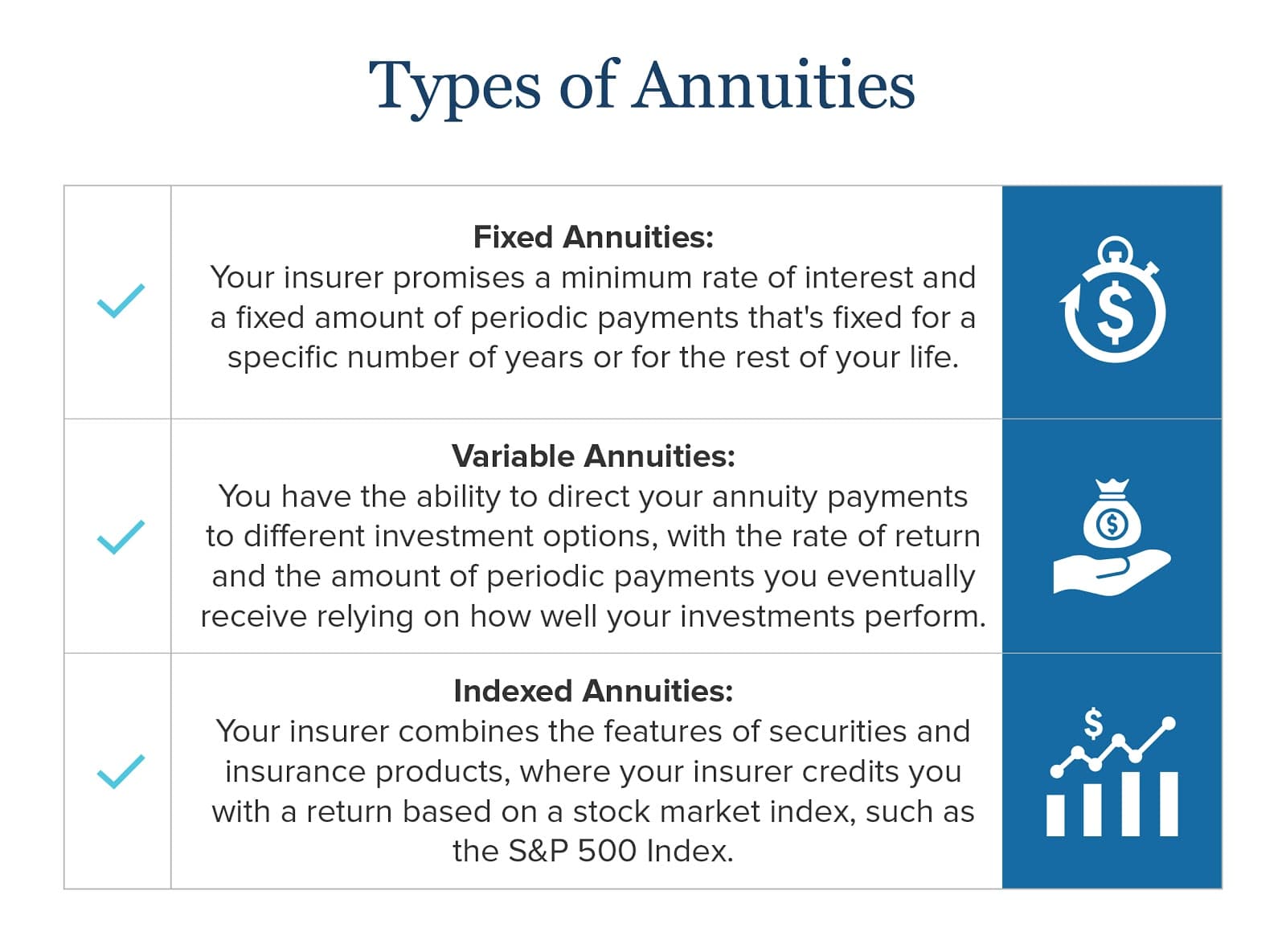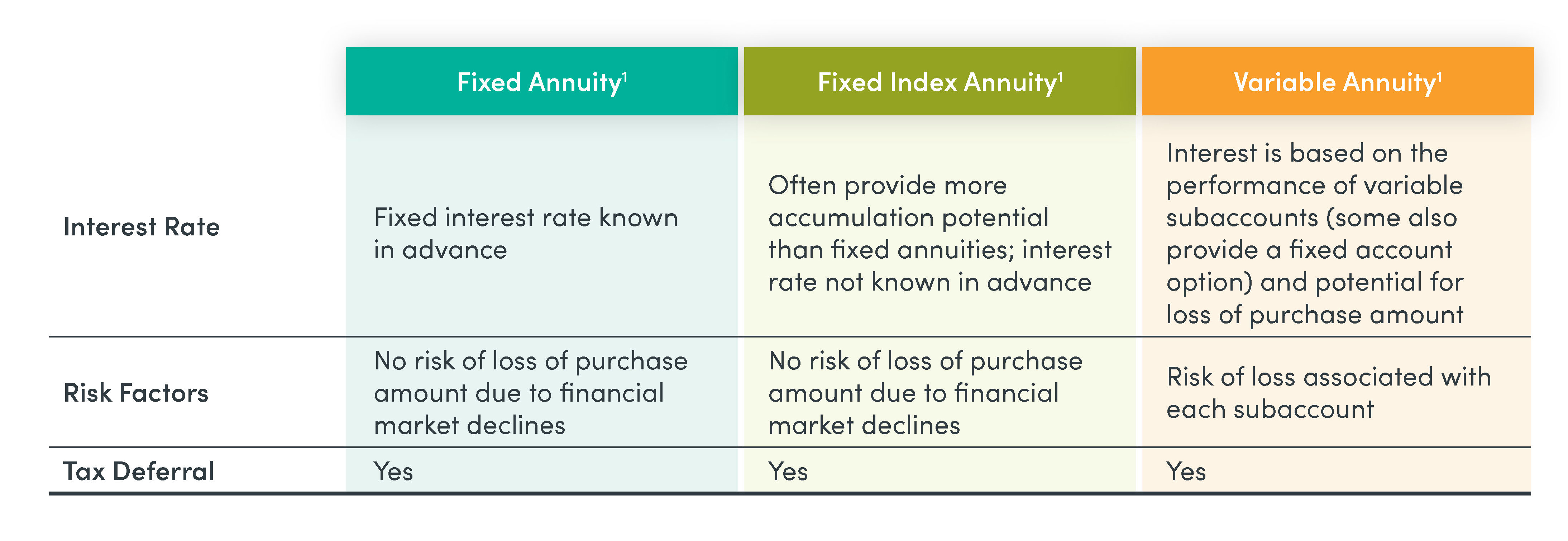Featured
Table of Contents
With a variable annuity, the insurance company purchases a portfolio of shared funds selected by the customer. The performance of those funds will figure out exactly how the account expands and exactly how huge a payout the purchaser will ultimately receive. People who select variable annuities agree to tackle some degree of risk in the hope of producing bigger revenues.
If an annuity customer is married, they can pick an annuity that will proceed to pay income to their spouse need to they pass away. Annuities' payments can be either prompt or deferred. The fundamental inquiry you need to think about is whether you want regular income now or at some future date.
A deferred payment allows the cash in the account even more time to grow. And similar to a 401(k) or an specific retired life account (IRA), the annuity continues to build up revenues tax-free until the cash is taken out. With time, that can accumulate right into a considerable amount and cause larger repayments.
With an immediate annuity, the payouts begin as quickly as the buyer makes a lump-sum settlement to the insurance provider. There are some other vital choices to make in acquiring an annuity, depending upon your conditions. These consist of the following: Buyers can schedule settlements for 10 or 15 years, or for the rest of their life.
Decoding Variable Annuity Vs Fixed Annuity A Comprehensive Guide to Fixed Vs Variable Annuity Breaking Down the Basics of Investment Plans Benefits of Choosing the Right Financial Plan Why Deferred Annuity Vs Variable Annuity Can Impact Your Future Deferred Annuity Vs Variable Annuity: Explained in Detail Key Differences Between What Is Variable Annuity Vs Fixed Annuity Understanding the Rewards of Long-Term Investments Who Should Consider Strategic Financial Planning? Tips for Choosing the Best Investment Strategy FAQs About Fixed Vs Variable Annuity Common Mistakes to Avoid When Planning Your Retirement Financial Planning Simplified: Understanding Fixed Income Annuity Vs Variable Growth Annuity A Beginner’s Guide to Smart Investment Decisions A Closer Look at How to Build a Retirement Plan
That might make good sense, as an example, if you need an earnings increase while settling the last years of your home loan. If you're wed, you can choose an annuity that pays for the rest of your life or for the rest of your partner's life, whichever is longer. The last is usually described as a joint and survivor annuity.
The selection in between deferred and instant annuity payouts depends greatly on one's savings and future earnings goals. Immediate payments can be helpful if you are currently retired and you need an income to cover daily expenses. Immediate payments can begin as quickly as one month right into the acquisition of an annuity.
People usually acquire annuities to have a retirement revenue or to construct savings for an additional objective. You can purchase an annuity from a licensed life insurance coverage representative, insurer, monetary planner, or broker. You need to talk with an economic advisor regarding your demands and objectives before you get an annuity.
The distinction in between both is when annuity payments start. allow you to save money for retirement or various other factors. You don't have to pay tax obligations on your incomes, or contributions if your annuity is an individual retirement account (IRA), up until you withdraw the incomes. allow you to produce an income stream.

Deferred and prompt annuities provide a number of alternatives you can choose from. The alternatives provide different levels of prospective threat and return: are guaranteed to gain a minimal rate of interest price.
enable you to select between sub accounts that are comparable to mutual funds. You can earn extra, but there isn't an assured return. Variable annuities are higher danger due to the fact that there's a chance you could lose some or every one of your cash. Set annuities aren't as high-risk as variable annuities because the financial investment danger is with the insurance provider, not you.
Decoding Retirement Income Fixed Vs Variable Annuity Everything You Need to Know About Fixed Vs Variable Annuity Pros Cons What Is Fixed Annuity Or Variable Annuity? Pros and Cons of Various Financial Options Why Choosing the Right Financial Strategy Is a Smart Choice Annuities Fixed Vs Variable: How It Works Key Differences Between Fixed Annuity Or Variable Annuity Understanding the Rewards of Long-Term Investments Who Should Consider Strategic Financial Planning? Tips for Choosing Pros And Cons Of Fixed Annuity And Variable Annuity FAQs About Planning Your Financial Future Common Mistakes to Avoid When Choosing a Financial Strategy Financial Planning Simplified: Understanding Variable Annuity Vs Fixed Annuity A Beginner’s Guide to Annuity Fixed Vs Variable A Closer Look at How to Build a Retirement Plan
Set annuities assure a minimum rate of interest rate, normally between 1% and 3%. The company may pay a greater passion price than the guaranteed interest price.
Index-linked annuities reveal gains or losses based upon returns in indexes. Index-linked annuities are a lot more complicated than fixed deferred annuities. It is very important that you comprehend the features of the annuity you're taking into consideration and what they imply. The 2 legal attributes that affect the quantity of rate of interest credited to an index-linked annuity one of the most are the indexing approach and the engagement price.
Analyzing Pros And Cons Of Fixed Annuity And Variable Annuity A Closer Look at How Retirement Planning Works Defining the Right Financial Strategy Advantages and Disadvantages of Fixed Vs Variable Annuity Pros And Cons Why Choosing the Right Financial Strategy Is Worth Considering How to Compare Different Investment Plans: How It Works Key Differences Between Different Financial Strategies Understanding the Key Features of Long-Term Investments Who Should Consider Strategic Financial Planning? Tips for Choosing What Is Variable Annuity Vs Fixed Annuity FAQs About Planning Your Financial Future Common Mistakes to Avoid When Choosing Annuities Fixed Vs Variable Financial Planning Simplified: Understanding Your Options A Beginner’s Guide to Fixed Income Annuity Vs Variable Growth Annuity A Closer Look at How to Build a Retirement Plan
Each depends on the index term, which is when the company computes the rate of interest and credits it to your annuity. The identifies how much of the increase in the index will be made use of to calculate the index-linked interest. Other crucial attributes of indexed annuities consist of: Some annuities cover the index-linked passion rate.
The floor is the minimum index-linked rates of interest you will certainly gain. Not all annuities have a flooring. All fixed annuities have a minimum guaranteed worth. Some companies utilize the average of an index's value as opposed to the value of the index on a defined day. The index averaging may occur whenever throughout the term of the annuity.
Exploring the Basics of Retirement Options Key Insights on Annuities Variable Vs Fixed Defining the Right Financial Strategy Pros and Cons of Fixed Vs Variable Annuities Why Choosing the Right Financial Strategy Matters for Retirement Planning Annuities Fixed Vs Variable: Explained in Detail Key Differences Between Different Financial Strategies Understanding the Risks of Long-Term Investments Who Should Consider Strategic Financial Planning? Tips for Choosing the Best Investment Strategy FAQs About Fixed Indexed Annuity Vs Market-variable Annuity Common Mistakes to Avoid When Choosing a Financial Strategy Financial Planning Simplified: Understanding Your Options A Beginner’s Guide to Smart Investment Decisions A Closer Look at Deferred Annuity Vs Variable Annuity
Other annuities pay substance passion during a term. Compound passion is rate of interest earned on the cash you conserved and the interest you earn.
This portion may be made use of as opposed to or in enhancement to an involvement rate. If you secure all your money before the end of the term, some annuities won't credit the index-linked passion. Some annuities might attribute just part of the passion. The percent vested typically enhances as the term nears the end and is always 100% at the end of the term.
This is due to the fact that you birth the financial investment threat as opposed to the insurance provider. Your agent or economic adviser can aid you decide whether a variable annuity is appropriate for you. The Stocks and Exchange Compensation classifies variable annuities as safety and securities because the performance is originated from supplies, bonds, and other financial investments.

Find out more: Retirement in advance? Think regarding your insurance policy. An annuity contract has two phases: an accumulation stage and a payment stage. Your annuity makes passion during the buildup stage. You have several choices on how you add to an annuity, depending upon the annuity you buy: permit you to pick the moment and amount of the settlement.
allow you to make the same repayment at the same period, either monthly, quarterly, or yearly. The Internal Profits Service (IRS) regulates the taxes of annuities. The internal revenue service permits you to postpone the tax obligation on profits till you withdraw them. If you withdraw your incomes prior to age 59, you will possibly need to pay a 10% early withdrawal charge in addition to the tax obligations you owe on the rate of interest earned.
After the accumulation phase finishes, an annuity enters its payout stage. There are several options for getting repayments from your annuity: Your business pays you a repaired amount for the time mentioned in the contract.
Exploring the Basics of Retirement Options Everything You Need to Know About Financial Strategies Defining Fixed Vs Variable Annuities Features of Smart Investment Choices Why Choosing the Right Financial Strategy Matters for Retirement Planning Fixed Indexed Annuity Vs Market-variable Annuity: A Complete Overview Key Differences Between Different Financial Strategies Understanding the Rewards of Indexed Annuity Vs Fixed Annuity Who Should Consider Fixed Annuity Vs Equity-linked Variable Annuity? Tips for Choosing the Best Investment Strategy FAQs About Planning Your Financial Future Common Mistakes to Avoid When Planning Your Retirement Financial Planning Simplified: Understanding Your Options A Beginner’s Guide to Smart Investment Decisions A Closer Look at How to Build a Retirement Plan
Several annuities bill a fine if you withdraw money before the payment stage. This charge, called an abandonment fee, is usually highest possible in the early years of the annuity. The fee is frequently a percent of the withdrawn cash, and usually begins at around 10% and goes down every year up until the abandonment period mores than.

Annuities have other fees called lots or compensations. Sometimes, these fees can be as much as 2% of an annuity's worth.
Variable annuities have the potential for greater revenues, yet there's more risk that you'll lose money. Take care concerning putting all your possessions into an annuity. Agents and companies need to have a Texas insurance coverage permit to legitimately market annuities in the state. The issue index is a sign of a company's consumer solution record.
Annuities sold in Texas must have a 20-day free-look duration. Replacement annuities have a 30-day free-look duration.
Table of Contents
Latest Posts
Breaking Down Your Investment Choices A Comprehensive Guide to Investment Choices Defining the Right Financial Strategy Advantages and Disadvantages of Different Retirement Plans Why Variable Annuitie
Understanding Variable Vs Fixed Annuities Everything You Need to Know About Variable Annuity Vs Fixed Indexed Annuity What Is Retirement Income Fixed Vs Variable Annuity? Features of Fixed Vs Variable
Understanding Choosing Between Fixed Annuity And Variable Annuity Everything You Need to Know About Fixed Annuity Or Variable Annuity Defining Retirement Income Fixed Vs Variable Annuity Benefits of C
More
Latest Posts